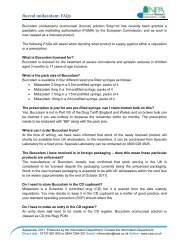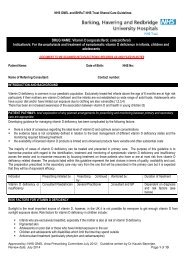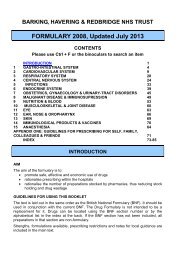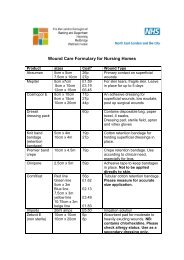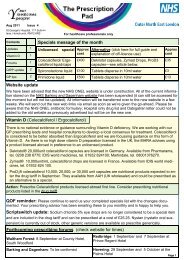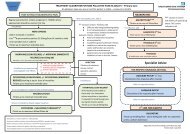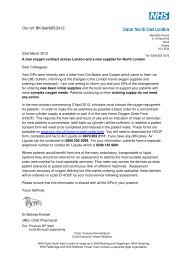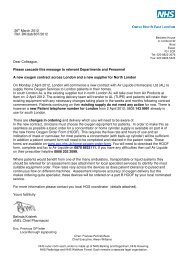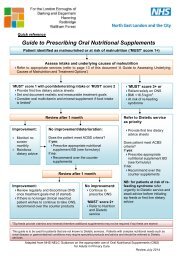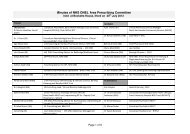i RILUZOLE Patient Name : Date of Birth: NHS No: Name of ...
i RILUZOLE Patient Name : Date of Birth: NHS No: Name of ...
i RILUZOLE Patient Name : Date of Birth: NHS No: Name of ...
Create successful ePaper yourself
Turn your PDF publications into a flip-book with our unique Google optimized e-Paper software.
i<br />
<strong>RILUZOLE</strong><br />
for Amyotrophic Lateral Sclerosis (a form <strong>of</strong> Motor Neurone Disease)<br />
DOCUMENT TO BE SCANNED INTO ELECTRONIC RECORDS AS AND FILED IN NOTES<br />
<strong>Patient</strong> <strong>Name</strong> : <strong>Date</strong> <strong>of</strong> <strong>Birth</strong>: <strong>NHS</strong> <strong>No</strong>:<br />
<strong>Name</strong> <strong>of</strong> Referring Consultant:<br />
Contact number:<br />
INTRODUCTION – Indication and Licensing<br />
Riluzole is lindicated to extend life or the time to mechanical ventilation for patients with Amyotrophic Lateral Sclerosis (a form <strong>of</strong><br />
Motor Neurone Disease)<br />
PATIENT PATHWAY- brief explanation <strong>of</strong> why planned arrangements for prescribing and monitoring between primary and secondary<br />
care are appropriate<br />
Clinical Speciality /<br />
Indication<br />
Neurology /<br />
Motor Neurone Disease<br />
Prescribing Initiated by Prescribing Continued<br />
by (detail when suitable for<br />
transfer to occur)<br />
Dr A Radunovic<br />
Consultant Neurologist<br />
for first 3 months<br />
Monitored by (detail when<br />
suitable for transfer to occur<br />
IF APPROPRIATE)<br />
GP after 3 months Consultant Neurologist<br />
for first 3 months, then<br />
GP. Hospital continue to<br />
see patient every three<br />
months, or less or more<br />
depending on the<br />
disease progression<br />
Duration <strong>of</strong> treatment<br />
Indefinite<br />
ORAL DOSE AND ADMINISTRATION<br />
• 50mg twice a day by mouth (doses spaced 12 hours apart). Doses should be taken at least one hour before, or two hours after<br />
food.<br />
• Supplied as 50mg tablets<br />
If patient is unable to swallow tablets, they may be crushed for administration via an enteral tube, or may be crushed and mixed<br />
with a s<strong>of</strong>t food product to aid swallowing. Care should be taken when using crushed tablets, as they may produce a local<br />
anaesthetic effect in the mouth. High fat meals reduce the extent and rate <strong>of</strong> absorption and should be avoided. <strong>No</strong>te: crushing<br />
tablets for administration is an <strong>of</strong>f-licence use <strong>of</strong> riluzole.<br />
MONITORING STANDARDS FOR MEDICATION AT BARTS AND THE LONDON <strong>NHS</strong> TRUST<br />
<strong>No</strong>te: be clear about what needs monitoring, normal parameters, how <strong>of</strong>ten and by whom. What results warrant referral back to the<br />
hospital team<br />
Parameter<br />
Target level<br />
Frequency <strong>of</strong> monitoring<br />
LFTs (bilirubin, ALT gamma-GT) and FBC with differential WBC<br />
<strong>No</strong>rmal ranges, but see below<br />
Monthly for 3 months, 3 monthly for 9 months and then annually<br />
thereafter.<br />
Increase frequency if liver disturbances develop.<br />
Action Stop treatment if ALT rises to five times the normal upper limit (0 -<br />
Approved by: <strong>NHS</strong> ONEL Area Prescribing Committee, <strong>No</strong>vember 2011; Guideline written by: Mr C. Tugwell and Dr A. Radunovic.<br />
Guidelines adapted for BHRuT use by: Elsy Gomez Campos Review date: <strong>No</strong>vember 2013
56iu/L) or if neutropenic (neutrophils
Consultant<br />
1. Ensure that the patient/carer is an informed recipient in therapy.<br />
2. Ensure that patients understand their treatment regimen and any monitoring or follow up that is required (using advocacy if<br />
appropriate). Issue any local patient information leaflets where appropriate.<br />
3. Ensure baseline investigations are normal before commencing treatment. Give the patient a patient held booklet for result<br />
monitoring if appropriate.<br />
4. Initiate treatment and prescribe until the GP formally agrees to share care (as a minimum, supply the first month <strong>of</strong> treatment or<br />
until patient is stabilised).<br />
5. Send a letter to the GP requesting shared care for this patient.<br />
6. Clinical and laboratory supervision <strong>of</strong> the patient by blood monitoring and routine clinic follow-up on a regular basis.<br />
7. Send a letter/results notification to the GP after each clinic attendance ensuring current dose, most recent blood results and<br />
frequency <strong>of</strong> monitoring are stated (unless otherwise covered by letter eg from Rheumatology Clinical Nurse Specialist or<br />
Pharmacy Drug Monitoring Service).<br />
8. Where the GP is not performing the phlebotomy, the blood test form MUST be annotated to request that blood results are also<br />
copied to the GP<br />
9. Evaluation <strong>of</strong> any reported adverse effects by GP or patient.<br />
10. Advise GP on review, duration or discontinuation <strong>of</strong> treatment where necessary. Where urgent action is required following tests<br />
the hospital team will telephone the patient and inform GP.<br />
11. Inform GP <strong>of</strong> patients who do not attend clinic appointments.<br />
12. Counsel the patient on contraception and what to do if pregnancy occurs. Document in the notes.<br />
13. Ensure that backup advice is available at all times.<br />
14. Ensure, where timing is appropriate, that the patient has received a flu vaccine prior to commencing treatment that is likely to<br />
cause immunosuppression. Document this in the patient notes and inform the GP it has been given<br />
General Practitioner<br />
1. Reinforce the patient’s understanding <strong>of</strong> the nature, effect and potential side effects <strong>of</strong> the drug before prescribing it as part <strong>of</strong> the<br />
shared care programme and contact the specialist for clarification where appropriate.<br />
2. Monitor patient’s overall health and well-being.<br />
3. Report any adverse events to the consultant, where appropriate.<br />
4. Report any adverse events to the CSM, where appropriate.<br />
5. Help in monitoring the progression <strong>of</strong> disease<br />
6. Maintain a patient held monitoring booklet where used<br />
7. Prescribe the drug treatment as described.<br />
PCT<br />
1. To provide feedback to trusts via Trust Medicines Committee.<br />
2. To support GPs to make the decision whether or not to accept clinical responsibility for prescribing.<br />
3. To support trusts in resolving issues that may arise as a result <strong>of</strong> shared care.<br />
<strong>Patient</strong>/ Carer<br />
1. Report any adverse effects to their GP and/or specialist<br />
2. Ensure they have a clear understanding <strong>of</strong> their treatment.<br />
3. Report any changes in disease symptoms to GP and/or specialist<br />
4. Alert GP and/or specialist <strong>of</strong> any changes <strong>of</strong> circumstance which could affect management <strong>of</strong> disease e.g. plans for pregnancy<br />
5. Take/ administer the medication as prescribed<br />
6. Undertake any monitoring as requested by the GP and/or specialist<br />
Costs<br />
Drug Product<br />
Riluzole (Rilutek)<br />
Based on BNF edition 62 (September 2011)<br />
Cost in primary care<br />
Basic <strong>NHS</strong> price: £320.33 for 1 month ( 56 x 50mg tablets)<br />
Approved by: <strong>NHS</strong> ONEL Area Prescribing Committee, <strong>No</strong>vember 2011; Guideline written by: Mr C. Tugwell and Dr A. Radunovic.<br />
Guidelines adapted for BHRuT use by: Elsy Gomez Campos Review date: <strong>No</strong>vember 2013
RESOURCES AVAILABLE<br />
Barking, Havering and Redbridge University Hospitals <strong>NHS</strong> Trust<br />
Consultant Neurologist (Dr A. Radunovic) 01708 435 000, extension: 7241<br />
SpR in Neurology on-call out <strong>of</strong> hours<br />
Aircall via switchboard<br />
Clinical Nurse Specialist (Esther Larsson) 020-73777000, extension 2523<br />
Drug Monitoring Clinic Pharmacist (where appropriate) Khalid Khan, DECT 6880<br />
<strong>NHS</strong> ONELPrescribing Team<br />
To confirm new number<br />
References<br />
• NICE Guidance on the Use <strong>of</strong> Riluzole (Rilutek) for the Treatment <strong>of</strong> Motor Neurone Disease (TA20), 2001.<br />
• British National Formulary (September 2011) page 312.<br />
• Summary <strong>of</strong> Product Characteristics – Rilutek (San<strong>of</strong>i-Aventis); last updated on the eMC: 07/07/2009.<br />
Refer to the <strong>NHS</strong> ONEL website to obtain the latest version <strong>of</strong> this guideline<br />
Approved by: <strong>NHS</strong> ONEL Area Prescribing Committee, <strong>No</strong>vember 2011; Guideline written by: Mr C. Tugwell and Dr A. Radunovic.<br />
Guidelines adapted for BHRuT use by: Elsy Gomez Campos Review date: <strong>No</strong>vember 2013
Appendix 1<br />
<strong>Name</strong> <strong>of</strong> Trust<br />
<strong>RILUZOLE</strong> SHARED CARE AGREEMENT LETTER<br />
<strong>Name</strong> <strong>of</strong> GP ………………………….… Address ………………………………….<br />
………….……………………....<br />
.……………………….…………<br />
..…………………………….….<br />
Dear GP<br />
Re:<br />
<strong>Patient</strong>’s <strong>Name</strong>……………..………………………………<br />
<strong>Date</strong> <strong>of</strong> <strong>Birth</strong>……………….………………………………<br />
Hospital Number……………..…………………………….<br />
Indication for …….…………………………………<br />
Route………(Oral/Intramuscular/Subcutaneous)- DELETE AS APPROPRIATE<br />
Dose…………….mg per week.<br />
Enclosed is a copy <strong>of</strong> the shared care guidelines for [Drug <strong>Name</strong>] to be retained in the patient’s notes.<br />
Should you agree to shared care, we will send a letter containing the details <strong>of</strong> the patient’s treatment plan, the dose to be<br />
prescribed and all relevant blood results.<br />
Please sign below and return this letter to the Hospital Specialist if you agree to the shared care arrangements for this<br />
patient.<br />
Many thanks<br />
Hospital Specialist<br />
GP<br />
Signature……………………...<br />
<strong>Name</strong> ………………..……...<br />
<strong>Date</strong>………………………...<br />
Signature……………………...<br />
<strong>Name</strong> ………………………...<br />
<strong>Date</strong>………………..…..……...<br />
If you are not taking on shared care for this patient please state the reason why and return this letter to the Hospital<br />
Specialist.<br />
…………………………………………………………………………………………………………………………………………………<br />
…………………………………………………………………………………………………………………………………………………<br />
………………….<br />
Approved by: <strong>NHS</strong> ONEL Area Prescribing Committee, <strong>No</strong>vember 2011; Guideline written by: Mr C. Tugwell and Dr A. Radunovic.<br />
Guidelines adapted for BHRuT use by: Elsy Gomez Campos Review date: <strong>No</strong>vember 2013



